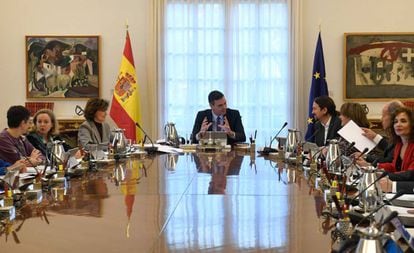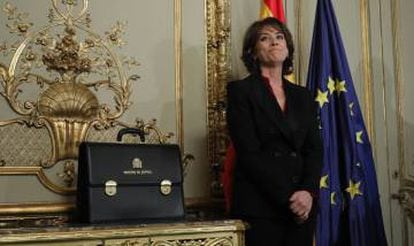
As was expected, Spain’s new coalition government has started its term by announcing good news. The debut measure adopted by the Cabinet, which met on Tuesday for the first time ever, was a 0.9% rise in pensions, a move that had been on hold until a government could finally be formed.
Prime Minister Pedro Sánchez, who gave a press conference when the Cabinet meeting ended, after weeks of avoiding questions from reporters, stated that the new executive wants to quickly make up for lost time, and plans on seeing out its full four-year term – despite lacking a working majority in Congress and needing the support of other parties if it is to pass legislation and see its budget approved.
The PM said today that Delgado’s résumé is “impeccable” and “unquestionable”
Sánchez won the November 10 repeat general election but, as at the April polls, fell short of an absolute majority. He managed to win a recent investiture vote in Congress, however, thanks to a coalition agreement between his Socialist Party (PSOE) and leftist Unidas Podemos, the support of a number of smaller parties, and the key abstention of the Catalan Republican Left (ERC).
The prime minister did not go into detail on Tuesday about the decisions that will have to be made in the coming days, including a pay rise for civil servants, a rise in the minimum wage and the government’s spending cap. But he did come out in defense of his first major appointment: that of former Justice Minister Dolores Delgado as prosecutor general.
The decision has caused widespread controversy given that the public prosecutor is supposed to operate independently of the government. Opposition politicians and critics say that the move will jeopardize the judiciary’s image of impartiality and make it look as if “there is political interference,” according to Cristina Dexeus, the president of the Asociación de Fiscales prosecutors’ association.

The prime minister said today that Delgado’s résumé is “impeccable” and “unquestionable,” and explained that he had called on her to “exercise her independence” as prosecutor general. As well as her role as minister, Delgado was also voted in as a PSOE deputy in November and campaigned for the party. But Sánchez insisted that this would not limit her independence, saying that she is “completely qualified to be the prosecutor general.”
Absent from the press conference today was one of Spain’s new deputy prime ministers, Pablo Iglesias, who is the leader of Unidas Podemos. The coalition deal between the parties came as a surprise after last year’s repeat election, given that such an agreement had proved impossible in the wake of the April polls. What’s more, Sánchez famously stated that he “wouldn’t be able to sleep at night” if he had accepted the demands of Unidas Podemos for a coalition deal.
On Tuesday, however, Sánchez insisted he had “no reservations” about Iglesias and the governing agreement. “On the contrary, I’m proud,” the prime minister told reporters. “It’s true that this is an unprecedented experience, but all of the ministers are now from the government of Spain and not from a political party.”
Sánchez gave a news conference after avoiding reporters’ questions for weeks
Catalonia and the independence drive in the northeastern Spanish region was a key issue among the questions journalists put to Sánchez on Tuesday. The prime minister insisted that he was opting for dialogue and “a political solution to a political problem.” He did not, however, go into more detail about the content of the negotiations that he has agreed to hold between the Spanish government and the Catalan regional government over the future of the region. These talks were a requirement from the ERC party in exchange for their abstention at the recent investiture vote.
Sánchez also sought to defend the plan to put any agreements reached from the Catalonia negotiations to a vote among the residents of the region. “If we can get to a consultation in Catalonia it will be because there has been a deal, and so I hope that will be the case, because that would mean that the crisis has been resolved,” he said. “All of this will be done under the safeguard of the Constitution, we are a pro-constitutional party, we don’t take lessons from anybody.”
Sánchez also made repeated references to the harshness of opposition parties during the investiture debate and in their subsequent statements to the press. “Before they would call me a squatter,” he said, in reference to criticism of the prime minister after he took power thanks to a successful vote of no confidence against former Popular Party Prime Minister Mariano Rajoy.
“Now they are questioning our legitimacy as a government. We call on them to recognize the result of the elections. They are trying to obstruct politics and now they want to obstruct justice. There needs to be renewal, that is what institutions such as [Spain’s CGPJ legal watchdog] require,” he added, in reference to the fact that the government will need the votes of opposition parties if it is to see new members elected to key institutions, including the Supreme Court and the Constitutional Court.
English version by Simon Hunter.
